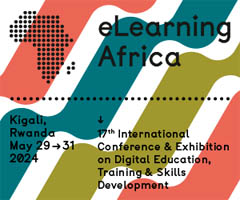Powerful Mobile Devices Continue to Contribute to Education
 London (UK), May 2010 - How can mobile phones add real value to students' learning experience? The varied components needed to ensure an appropriate educational design will be discussed at eLearning Africa 2010. Niall Winters from London Knowledge Lab will present a case study from Zanzibar: Veterinary Training with Mobile Phones.
London (UK), May 2010 - How can mobile phones add real value to students' learning experience? The varied components needed to ensure an appropriate educational design will be discussed at eLearning Africa 2010. Niall Winters from London Knowledge Lab will present a case study from Zanzibar: Veterinary Training with Mobile Phones.
Could you kindly to give our readers a short introduction to the case study?
Niall Winters: The potential of the mobile phone to support training and education in
Africa is well recognised, with mHealth applications being particularly advanced. However, current projects primarily focus on the distribution of educational content (e.g. short videos to raise awareness of HIV), behavioral change (e.g. support via SMS to help people quit smoking), and rudimentary drill-and-practice pedagogies such as quizzes.
While they have clear benefits, they are not designed for 21st-century learners. Consequently, new educational interventions facilitated by the affordances of mobile devices and social media applications are required.
This is particularly important for Africa as new, more powerful mobile devices continue to emerge; social media applications become more widely available (e.g. Microsoft OneApp project); and access to mobile internet becomes more affordable. We have developed one such intervention: the use of internet-connected phones in Zanzibar for in-situ veterinary training in mobile epidemiology.
What was the experiment's intention and what outcomes were expected?
Niall Winters: The aim of the three-week study was twofold:
- to determine how Android phones could support the collection of physical-exam data of animals using Google's Open Data Kit (ODK), and
- to determine how social-media applications (such as twitter) can support field logistics and communication between learners in the field and experts based at the home university.
Who was involved?
Niall Winters: The study was undertaken with veterinarians and veterinarian assistants from the Department of Agriculture, Zanzibar and veterinary students from the Royal Veterinary College (RVC) in the UK. Study participants self-identified as non-technical users of technology. The majority had basic phones for everyday use. None had used twitter on an ongoing basis in advance of the project.
What types of experience have been gained so far, and how have the reports of this experience been used?
Niall Winters: The Android operating system was not found to be immediately usable, but in the main, the ODK proved useful. The paperless option was valued, as was the upload to Excel via XML. The ability to geo-tag data-collection points provided students with the ability to map the farms they visited.
One participant felt that when using the ODK, they were missing the hands-on element of physical examination and were instead simply engaged in information gathering. Twitter was mainly used for field logistics and organization, providing a broadcast mechanism unavailable via SMS.
However, updates and replies were affected by the quality of network coverage. On the whole, participants did not use twitter for communication with RVC faculty regarding project specifics but did tweet updates on the progress of the project.









